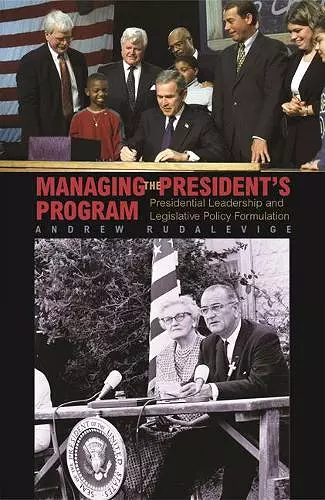Managing the President's Program
Presidential Leadership and Legislative Policy Formulation
Format:Paperback
Publisher:Princeton University Press
Published:8th Aug '02
Currently unavailable, and unfortunately no date known when it will be back

This is an impressive piece of work--extremely well written, clear and exhaustive, almost to a fault. Reflecting immense effort and scholarship, it offers presidency scholars new data, new insights, and interesting, often surprising findings. Managing the President's Program will soon take its place as the standard reference for work dealing with presidential-bureaucratic policymaking and its consequences. -- Daniel Ponder, University of Colorado Andrew Rudalevige has gained access to an exceedingly important and long awaited data set and will be the first one to publish results. He makes a very good case for the importance of centralization and ties this to the growing literature of 'new institutionalism,' an important emerging approach in quantitative studies of the presidency. His book will get considerable and deserved attention. -- Steven Shull, University of New Orleans
The belief that US presidents' legislative policy formation has centralized over time, shifting inexorably out of the executive departments and into the White House, is shared by many who have studied the American presidency. Andrew Rudalevige argues that such a linear trend is neither at all certain nor necessary for policy promotion.The belief that U.S. presidents' legislative policy formation has centralized over time, shifting inexorably out of the executive departments and into the White House, is shared by many who have studied the American presidency. Andrew Rudalevige argues that such a linear trend is neither at all certain nor necessary for policy promotion. In Managing the President's Program, he presents a far more complex and interesting picture of the use of presidential staff. Drawing on transaction cost theory, Rudalevige constructs a framework of "contingent centralization" to predict when presidents will use White House and/or departmental staff resources for policy formulation. He backs his assertions through an unprecedented quantitative analysis of a new data set of policy proposals covering almost fifty years of the postwar era from Truman to Clinton. Rudalevige finds that presidents are not bound by a relentless compulsion to centralize but follow a more subtle strategy of staff allocation that makes efficient use of limited bargaining resources. New items and, for example, those spanning agency jurisdictions, are most likely to be centralized; complex items follow a mixed process. The availability of expertise outside the White House diminishes centralization. However, while centralization is a management strategy appropriate for engaging the wider executive branch, it can imperil an item's fate in Congress. Thus, as this well-written book makes plain, presidential leadership hinges on hard choices as presidents seek to simultaneously manage the executive branch and attain legislative success.
Winner of the Neustadt award
- Winner of American Sociological Association Presidency Research Section Richard E. Neustadt Book Award 2003
ISBN: 9780691095011
Dimensions: unknown
Weight: 425g
296 pages